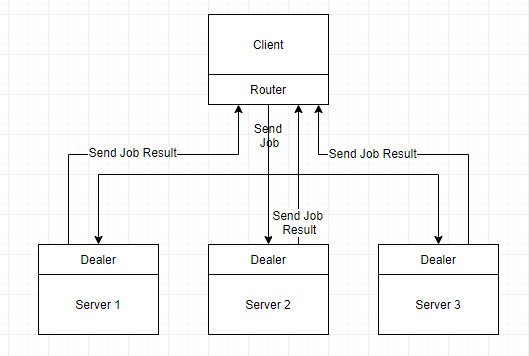I've put together this minimal example in order to send a message from a Router socket to a specific DEALER socker (That has it's identity set). When running these two programs it appears to hang on the ROUTER waiting from the reply from the DEALER, and the DEALER hangs waiting for the request from the ROUTER. So it appears that the message that the ROUTER is sending is never making it to the DEALER.
Router.cpp
#include <iostream>
#include <zmq.hpp>
#include <string>
#include <thread>
#include <chrono>
int main() {
zmq::context_t context;
zmq::socket_t socket (context, zmq::socket_type::router);
// Enforce sending routable messages only
socket.setsockopt(ZMQ_ROUTER_MANDATORY, 1);
socket.bind("tcp://*:5555");
try {
std::string jobRequest = "ExampleJobRequest";
std::cout << "Router: Sending msg: " << jobRequest << std::endl;
// Set the address, then the empty delimiter and then the request itself
socket.send("PEER2", ZMQ_SNDMORE);
//socket.send(zmq::message_t(), ZMQ_SNDMORE);
socket.send(zmq::str_buffer("ExampleJobRequest")) ;
// Set the address, then the empty delimiter and then the request itself
socket.send("PEER2", ZMQ_SNDMORE);
//socket.send(zmq::message_t(), ZMQ_SNDMORE);
socket.send(zmq::str_buffer("ExampleJobRequest")) ;
// Receive the reply from the camera
std::cout << "Router: Waiting for reply from camera " << std::endl;
zmq::message_t reply;
socket.recv(&reply);
std::cout << "Router: Received " << std::string(static_cast<char*>(reply.data()), reply.size()) << std::endl;
} catch (std::exception e) {
std::cout << "Router Error: " << e.what();
}
std::this_thread::sleep_for(std::chrono::seconds(1));
socket.close();
context.close();
}
Dealer.cpp
#include <zmq.hpp>
#include <string>
#include <iostream>
#include <thread>
int main (void)
{
// Prepare our context and socket
zmq::context_t context;
zmq::socket_t socket (context, zmq::socket_type::dealer);
std::cout << "Dealer: Connecting to RunJob server… \n";
socket.setsockopt(ZMQ_IDENTITY, "PEER2", 5);
socket.connect ("tcp://localhost:5555");
while(true) {
try {
// Wait for next request from client
std::cout << "Dealer: Waiting for request" << std::endl;
zmq::message_t request;
zmq::message_t empty;
// Receive request
socket.recv(&request);
std::string requestString = std::string(static_cast<char*>(request.data()), request.size());
std::cout << "Dealer: Received request" << std::endl;
std::cout << requestString << std::endl;
// ZMQ_SNDMORE - "Specifies that the message being sent is a multi-part message, and that further message parts are to follow"
socket.send(zmq::str_buffer("Job completed"), zmq::send_flags::dontwait);
}catch (std::exception e) {
std::cout << "Router Error: " << e.what();
}
}
// Used to set various 0MQ Socket Settings
// ZMQ_Linger - Set linger period for socket shutdown
socket.setsockopt(ZMQ_LINGER, 0);
socket.close();
context.close();
return 0;
}
I had originally considered that I should be prepending the message with an empty delimiter, socket.send(zmq::message_t(), ZMQ_SNDMORE);, but this caused an error. Also using the following also caused an error to be thrown in the try/catch block. The error simply prints 'Unknown error':
zmq::message_t delimiter(0);
socket.send(delimiter, ZMQ_SNDMORE);
Using the following to create the delimiter also causes the same error:
socket.send(zmq::message_t(), ZMQ_SNDMORE);
To my knowledge, when using cppzmq you don't need to add the empty delimiter (I could be wrong about this, but after reading around and looking at other peoples example and testing my own code, this is what i determined).
Here's a very basic diagram with the end goal of this design :
In my research, i haven't found a good example of this code. The Cppzmq github has very little documentation and few examples.
Here are some other sources i've looked at:

